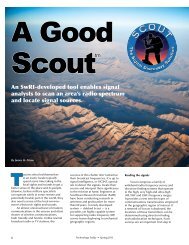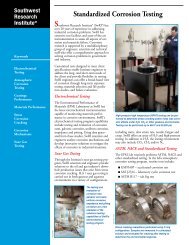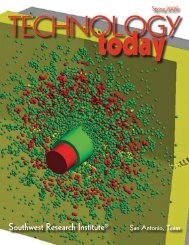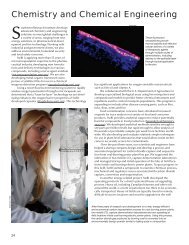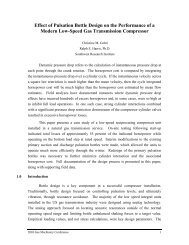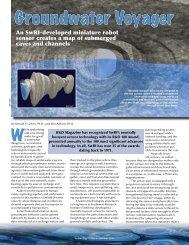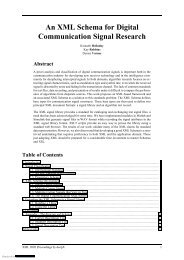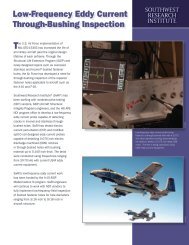Technology Today - Southwest Research Institute
Technology Today - Southwest Research Institute
Technology Today - Southwest Research Institute
Create successful ePaper yourself
Turn your PDF publications into a flip-book with our unique Google optimized e-Paper software.
Fifteen Years Strong<br />
SwRI’s Planetary<br />
Science Directorate<br />
has built a worldwide<br />
reputation on<br />
investigating mysteries<br />
across time and space,<br />
from the death of the<br />
dinosaurs to a close-up<br />
look at Pluto<br />
D017269<br />
In 1994, <strong>Southwest</strong> <strong>Research</strong> <strong>Institute</strong> (SwRI) opened an<br />
office in Boulder, Colo., aimed at establishing a planetary astronomy<br />
research group in this scientifically fertile region at the base<br />
of the Rocky Mountains. At that time, the office comprised two<br />
scientists and a part-time administrative assistant. By its 15th<br />
anniversary in 2009, the staff had grown to more than 65 employees<br />
who study nearly every aspect of the solar system and related<br />
astronomical topics, lead and participate in space missions, develop<br />
instrumentation and conduct laboratory studies.<br />
The Planetary Science Directorate has since established<br />
itself as a world-recognized center of planetary research. It hosts<br />
a steady stream of international visiting scientists and engineers,<br />
and organizes workshops and meetings with focused scientific and<br />
space exploration topics. This article highlights a sample of the<br />
diverse areas of research that evolved into large programs including<br />
moon and small body dynamics, the outer solar system, Mars, solar<br />
physics and space operations.<br />
Moon and<br />
Small Body<br />
Dynamics<br />
D016087<br />
Space scientists<br />
at Boulder perform<br />
research<br />
spanning the evolution of<br />
small bodies, such as asteroids, comets,<br />
mete oroids and dust, to the formation<br />
of the planets and satellites like the<br />
Moon. The ultimate goal is to explore<br />
how and when the planet formed, why it<br />
has water and other conditions suitable<br />
for life, and whether it is possible that<br />
other Earth-like planets exist elsewhere.<br />
In essence, the exploration of how the<br />
solar system came to be is also a way to<br />
understand our place in the universe.<br />
A particular topic of interest to both<br />
scientists and the public is the meteorite<br />
impact believed to have wiped out the<br />
2<br />
<strong>Technology</strong> <strong>Today</strong> • Winter 2009



